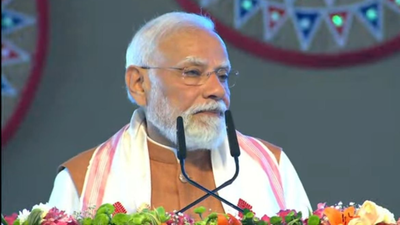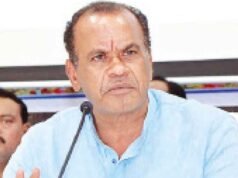Hyderabad: A two-judge panel of the Telangana High Court, comprising Justice Moushumi Bhattacharya and Justice Gadi Praveen Kumar, will continue hearing a writ petition on the question of statutory inconsistencies between the Sarfaesi (Securitisation and Reconstruction of Financial Assets and Enforcement of Security Interest) Act and the Debt Recovery Act.
The panel heard inconclusively a writ plea filed Suryajyothi Spinning Mills Ltd challenging the refusal by the National Company Law Tribunal (NCLT) to grant further time in the liquidation proceedings for consideration of a scheme of compromise and arrangement under the Companies Act, read with the IBBI (Liquidation Process) Regulations. The panel was dealing with a writ petition, filed by Arun Kumar Agarwal. It was contended by the petitioner that the order of NCLT was contrary to the intent and framework of the Insolvency and Bankruptcy Code, 2017. It was also pointed out that there are inconsistencies with the Sarfaesi Act, and the Recovery of Debts Due to Banks and Financial Institutions Act.
The dispute stemmed from liquidation proceedings initiated by the SBI. Before the NCLT, counsel for the petitioner sought yet another extension for the promoter, Arun Agarwal, citing illness and delays in submitting documents to the financial creditor. The NCLT rejected the request, noting that although Regulation 2B mandated that proposals under Section 230 must be considered within 90 days from commencement of liquidation, the scheme had remained pending for over a year. The NCLT also observed that multiple extensions had been granted, culminating in a final 90-day extension in August 2025 after which the liquidator was directed to proceed with liquidation if no decision was reached. Finding that the promoter’s explanation “did not inspire confidence” and appeared calculated to “delay and frustrate the liquidation process,” the NCLT dismissed the application and directed the liquidator to continue the liquidation in accordance with law. After hearing submissions from both sides, the panel directed the State Bank of India to file its response in the matter.
2. IOCL termination of dealership upheld by HC
Justice Nagesh Bheemapaka dismissed a writ petition challenging a decision of Indian Oil Corporation Limited (IOCL) to terminate a contract of a dealer of its petroleum dealership in Vikarabad over alleged tampering of a fuel dispensing unit.
The judge was dealing with a writ petition filed by Md. Muzaffar Hussain, who claimed IOCL officials acted out of bias and personal vengeance, fabricated evidence, and conducted a procedurally flawed inquiry based on “false and manipulated” technical reports. He alleged that he had no technical capability to tamper with the dispensing unit and accused certain IOCL officers and GVR service technicians of harassment. IOCL countered that the termination was supported by the GVR technology audit and compliance cell (TACC) report, which found unauthorised soldering, track cuts and rework on critical components of the CPU card indicating manipulation designed to alter the totaliser readings of the dispensing unit. The judge noted that the inspection, seizure, sealing and laboratory analysis had been carried out either in the presence of the dealer or his representative.
The sealed components were opened at the GVR lab in Coimbatore in the presence of the dealer’s brother, who signed the minutes confirming their integrity. “The apprehension of bias is baseless. This court does not find any illegality or procedural impropriety in the impugned order,” Justice Bheemapaka held, adding that the petitioner could not bypass the alternative remedy by merely terming it futile, as the dealership agreement itself mandates arbitration for resolving such disputes.
3. Court reprimants revenue over promotion
Justice Surepalli Nanda of the Telangana High Court reprimanded the actions of the revenue department for failing to consider the promotion of a deputy tahsildar to the post of tahsildar, citing an interim order in a separate writ petition as the reason for withholding her elevation.
The judge was dealing with a writ petition filed by Ch. Vimala Venkata Ramana, who contended that despite being selected as deputy tahsildar in 2017, joining the post in April 2018, and having her services regularised with probation declared, her promotion was being denied. The department argued that she had been re-allotted to Andhra Pradesh in the revised selection list published in 2018, and that she continued in Telangana only because of a stay granted by the High Court.
The petitioner pointed out that similarly situated employees in other departments — including those selected under the same notification — had been promoted pending disposal of their cases, while only the revenue department was denying her the same benefit. The judge noted that the respondents had not rebutted this assertion and held that equality of treatment under the Constitution could not be denied. The judge observed that the government, as model employer, could not apply different standards across departments. Referring to its earlier interim order directing the authorities to consider her case in line with similarly placed employees, the court disposed of the writ petition, directing the revenue department to consider her promotion to the post of tahsildar in accordance with law.
4. Judge slams invocation of HC’s extraordinary powers
Justice Anil Kumar Jukanti of the Telangana High Court expressed strong reservations over the invocation of extraordinary jurisdiction to secure continued occupation of government residential quarters, observing that retired beneficiaries cannot “indefinitely enjoy” privileges intended for serving personnel.
The judge was hearing a writ plea filed by Md Umar and others challenging the proposed eviction from official quarters. The petitioners contended that the premises in question were “surplus quarters,” contending that staffing levels in the concerned establishment had gradually declined over the years, thereby leaving multiple units unutilised.
The judge noted that the official records reflected the presence of numerous allottees who continued to occupy quarters while allegedly defaulting on utility payments. The judge remarked that such occupants were obliged to clear all dues along with interest, failing which the competent authority was fully empowered to initiate appropriate action.
Questioning the very maintainability of the writ petition, the judge observed that seeking directions under Article 226 for the purpose of securing residential premises was “legally untenable and conceptually absurd,” especially when a complete administrative framework existed for allotment, regulation, and eviction of government housing.
The judge queried whether any statutory guidelines governing retention or vacation of such accommodation were being followed and why the respondents had not exercised their own authority. During the course of hearing, the judge also took exception to a former public representative continuing to hold possession of an official unit without demonstrated entitlement. Issuing strict instructions to the respondent authorities, the judge directed them to obtain clear instructions from the competent officers, failing which the concerned officials would be summoned to appear personally.






